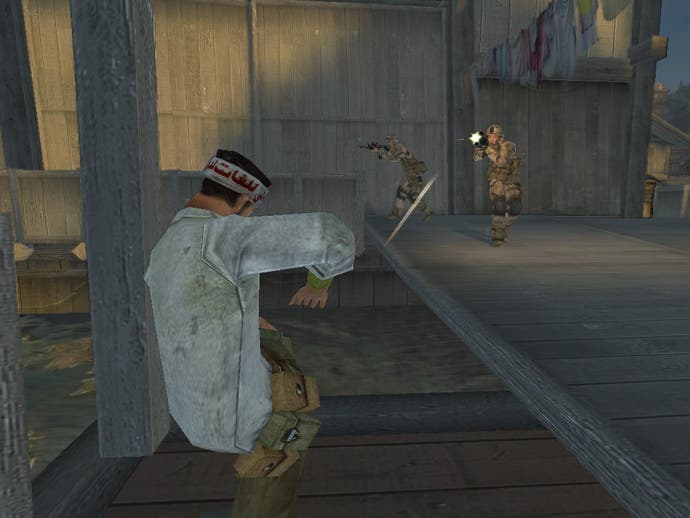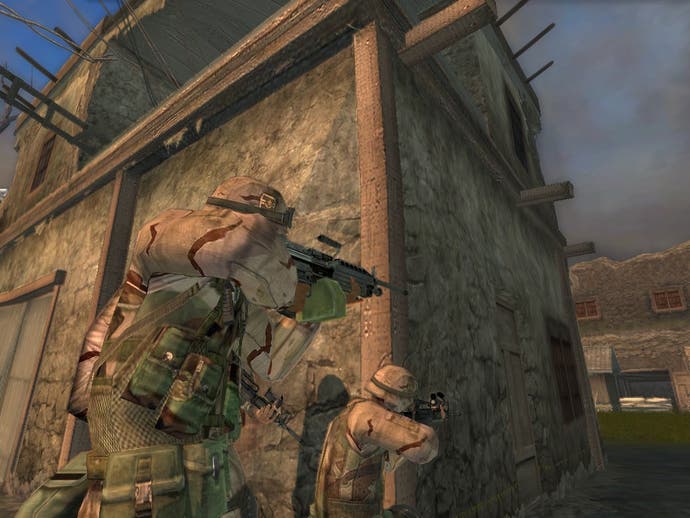Full Spectrum Warrior: Ten Hammers
Shaka Hislop couldn't make it for this one.
The problem is, Pandemic still wants to wrestle combat control away from players wherever possible, and stops tantalisingly short of allowing you to click the trigger by implementing a system where it's more about the timing and direction of the command itself than the action. By doing so, combat feels clumsy at times, and you'll inevitably find yourself falling victim to a catalogue of one-hit-death scenarios. The margin for error in these Precision Fire situations is incredibly tight to the point where a split second delay makes the difference between success and failure, and the blame here comes from a fascist health system that assumes that one bullet equals instant incapacitation. Sure, you can potentially drag them back to the Casevac once you've cleared up, but doing so is a time consuming bore. Like we said, it might be realistic, but is it fun? All we really wanted to do was administer a medipack and get the hell on with the game.
And the reason for resorting to the risk-taking Precision Fire a lot of the time is that you'll really struggle to pick off enemies using the old fashioned methods of the original game unless you do. Making good use of cover just isn't enough any more when you're facing an enemy so entrenched that you're relying on some crazy AI behaviour to squeak by. With only four frag and smoke grenades in your arsenal, you can't rely on changing cover and flanking tactics alone - especially when the penny drops that every single level is designed to test you every step of the way. We definitely welcome a more aggressive enemy that acts to flank you, but in Ten Hammers' case it's not dynamic, intelligent flanking, it's actually scripted to the extent that you can clear an entire area, take up a theoretically safe cover point only for two enemies to appear either side of you and cap you before you've even had a second to react. By forcing the player into a tough memory game, you end up making progress via quite torturous trial and error sessions that can take hours.
Part of this is down to the inability to quicksave, part is down to the one-hit-kill health system, and another is the fact that the very mechanics of the game don't make it conducive to responding quickly. In a typical third-person shooter you'd be able to duck and dodge immediately, take a small amount of damage and respond in kind. In Ten Hammers it's Game Over before you've even had a chance to shift the camera around to see what's shooting at you. And if you don't believe us, check out some of the US forums, where the over-riding theme is "why is this game so much harder than the original?" We asked ourselves the same question on the several hundred occasions we died. The other question we asked repeatedly was "is this fun?" and the conclusion we came to every time was "it isn't."

Admittedly, there are some more advanced moves that can help you outwit the enemy, but the game makes little effort to explain them or reinforce them to the player. Once the tips are gone it's too easy to forget them, and arrive either too early in the game, or inexplicably late on. Things like the ability to 'Hot Move' gives your squad an inexplicable extra degree of awareness so that, for example, enemies stationed above you don't come as a surprise - but you're told about it several hours in. The 'Scout' move is pretty useful too, allowing you to send someone running ahead to check a location for enemies before the team arrives - but, again, Pandemic makes no effort to fully explain the potential usefulness of this order. Likewise, the ability to split your squad up into Buddy Teams is merely touched upon right at the beginning at a time when you've barely learned the basics. It's one of those things you've always got in the back of your mind to use, but one that is risky, given the advantage of having four men all firing on a section at once, and something you'll not want to experiment with when you know that if you die, there's ten minutes of careful planning to run through again.
On paper, almost every single one of Ten Hammers' new ideas is good in theory, and should make the experience a more authentic-feeling one, but somewhere along the line the fun that flowed out of the original has been drained away by over-fussy psychic AI, an unforgiving health system and the need to constantly take risks in order to take out entrenched enemies. All of those things lined up together make it a real chore to pick through the 12 levels and leave you wishing for the idle refined simplicity of version 1.0. Ten Hammers feels more like version 1.5, with the legacy of some of the original's flaws, designed by people who believe that maker a game more 'challenging' makes it better. It doesn't. We realise some people prefer their games to really test them to the limit (in which case you'll love this), but for the mere mortals among us, this takes things way too far in the other direction.
And given that the gameplay is a V1.5-esque progression, it's hardly a surprise that it's also weighted down by a creaky-looking game engine that struggles to render environments to an impressive strandard. As early as the second level entire chucks of scenery disappear and pop back in before your eyes, while even minor items pop up on the ground on the game's highest detail settings. There are a few minor concessions to physics, with scaffolding disintegrating and degradable cover points, and some nice incidental touches, like birds flying through the sky and suchlike, but it can't mask the ageing character models and their lack of animation. Even the texturing is distinctly last gen, making its old gen console roots very apparent. No wonder it's not being released on 360.

In multiplayer terms, the old co-op mode returns to allow you to take on the campaign with a buddy controlling one of the two squads, but the main thing of interest is the competitive multiplayer mode for up to eight players. As expected, it's the US (or Coalition) versus those bad old Insurgents across eight distinct scenarios, giving you the chance to play on one side of various conflicts (for example, the US vs. Mujahideen or Al Ra'id, or the Coalition vs. Mujahudeen, etc). Played in a similar fashion to the main game, the US forces operate in fire teams and have the better arsenal, but have to cope with the superior numbers of the the insurgents who operate alone and can hire NPCs along the way. The general idea is to protect/attack key items or locations, such as Radio Towers, ammo stockpiles, bombs and the like, though this mode ends up feeling not dissimilar to the main game. Whatever the premise, it's never that thrilling in practice with much of the action based on second guessing where your enemy is likely to appear and struggling to overcome the control limitations inherent in FSW. Give us direct control any day.
After having a lot of fun with the original, we were really looking forward to Ten Hammers. But right from the word go it takes a backward step by trying too hard to (ulp) be authentic and realistic, introducing some shonky control elements that never quite work and almost completely overlooking the fun aspect that was there in spades last time around. It goes without saying that military combat is a highly dangerous business, riddled with uncertainty, but demonstrating that in a videogame has to be done so with the player's enjoyment as the priority. As soon as you let the game's own AI rule the roost, you've created a recipe for a frustrating experience that takes more dogged determination that all but the most patient, saintly player has to invest in a game. Ten Hammers isn't a terrible game by any means, but it's a potentially great game ruined by a few questionable design decisions that make it feel more like work than entertainment. Unless you like gaming masochism, you'll be screaming along with us, wondering how the normally reliable Pandemic got it so wrong this time.








